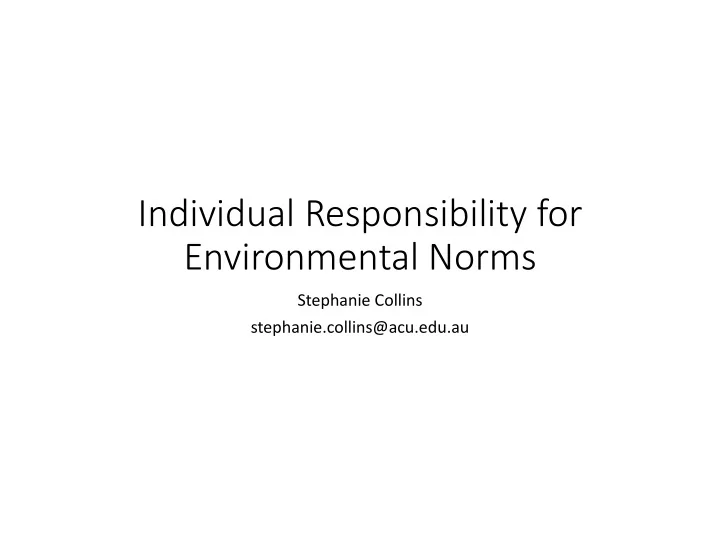

Individual Responsibility for Environmental Norms Stephanie Collins stephanie.collins@acu.edu.au
Question: What should be the primary content or focus of individuals looking to perform their climate‐related obligations? Answer: Promoting social norms, specifically anti‐fossil‐fuel norms.
1. Offsetting and other ‘private sphere’ actions rely on a false private/public dichotomy. • Climate harms are linearly related to the amount of greenhouse gas in the atmosphere, making it possible to offset enough that it’s as if one had emitted nothing at all—even if one continues to indulge in extremely luxurious emissions. • At current offsetting prices this would cost maybe $20, 000 per lifetime. • Yet the average affluent lifestyle needs dramatic reform if we are to mitigate climate change. Offsetting can be done with no such reform. Where does offsetting go wrong?
1. Offsetting and other ‘private sphere’ actions rely on a false private/public dichotomy. • (1) Benefitting from injustice: A’s climate inaction makes B’s offsetting cheaper. • (2) Offsetting is only a partial solution (if everyone did it, it’d be too expensive: it’s not universalizable as an institution). It needs other mitigation/adaption strategies too. • Broome: distinction between private morality (demanding that individuals not harm others) and public morality (demanding that governments do good). • But there are problems with any attempt to divide climate ethics into ‘private’ and ‘public’ spheres…
1. Offsetting and other ‘private sphere’ actions rely on a false private/public dichotomy. • Parallel to Susan Moller Okin’s Justice, Gender, and the Family : 1. Decisions in private life are not exempt from exactly the ethical considerations that generate the government’s obligation to do good. (Capacity to do good.) 2. The state regulates, permits, and subsidises transactions in the ‘private sphere’ that lead to climate harms. The spheres are causally and constitutively interlinked, suggesting their ethical principles should be interlinked too. 3. No clear dichotomy between private and public regarding the norms children learn growing up: ‘private’ actions affects others’ views on ‘political’ acceptability. 4. The private sphere creates barriers to participation in the public sphere (offsetting with nothing left for more ‘political’ actions). • We should reject the public/private distinction in climate ethics.
2. Focusing on social norms has several advantages. • We follow norms because of what others will think of us or do to us if we don’t. • Doesn’t mean we consciously think about these things (Witt (2011) on ‘normative pull). • But others’ thoughts and actions are the underlying cause of conformity. • Social norms’ content is grounded in ‘how things are done around here.’ • Social norms are implicated across the private/public spectrum (previous slide). • Social norms are a key vehicle via which individuals do climate harm and benefit from climate injustice: current social norms permit emitting (doing harm) and praise offsetting (benefitting from injustice). We can also do good by changing norms. Addressing norms = addressing all three obligations.
2. Focusing on social norms has several advantages. 1. Their content can be general enough to hold across the public/private spectrum. 2. An obligation to ‘promote norms’ is flexible across different contexts. 3. Changing norms is better for changing behaviour than economic sanctions. 4. Changing norms is a step to changing laws (which cannot easily be changed without perceived public mandate). 5. Focus on norms fits with social‐psychological research on ‘carbon capability’ – carbon capable individuals ‘seek to influence through collective and political mechanisms’ (Whitmarsh et al 2009). 6. Norms make policies stable. 7. Much current high‐emissions behaviour is either (1) a mere custom, not a norm; or (2) contingently connected to norms; or (3) even if it is a norm, is not a moral norm.
3. Focusing on anti‐fossil fuel social norms specifically has several advantages. • Norms that target individuals’ behaviour are very demanding (obligation to promote norms that sanction one’s own behaviour). • Alternative: obligation to promote norms that target large organisations: norms against extracting and burning fossil fuels, and (by extension) norms against funding or investing in those who extract and burn fossil fuels. • These norms are underpinned by a moral norm with wide currency: don’t recklessly do large‐scale harm. This makes these norms satiable and prohibitive: intuitive, stringent, easy to assess for violations. Overcomes psychological roadblocks to emissions‐reduction (complex, large‐scale, unintentional).
Conclusion • A simplistic divide of climate ethics into ‘public’ and ‘private’ domains is untenable. • There is a third way (better) way to think about individual climate action: rather than directly addressing policymakers, and rather than being about an individual’s own ‘clean hands,’ an individual’s climate action can usually target the informal tissue that binds policy and individuals: social norms.
Recommend
More recommend